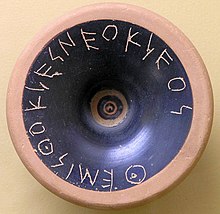
Back Quorum (Politik) ALS نصاب قانوني Arabic Kvorum Azerbaijani Kvorum BS Kvórum Czech Quorum (Politik) German Kvorumo Esperanto Cuórum Spanish Kvoorum Estonian حد نصاب Persian
The examples and perspective in this article may not represent a worldwide view of the subject. (August 2017) |

A quorum is the minimum number of members of a group necessary to constitute the group at a meeting.[2] In a deliberative assembly (a body that uses parliamentary procedure, such as a legislature), a quorum is necessary to conduct the business of that group. According to Robert's Rules of Order Newly Revised, the "requirement for a quorum is protection against totally unrepresentative action in the name of the body by an unduly small number of persons."[3] In contrast, a plenum is a meeting of the full (or rarely nearly full) body. A body, or a meeting or vote of it, is quorate if a quorum is present (or casts valid votes).
The term quorum is from a Middle English wording of the commission formerly issued to justices of the peace, derived from Latin quorum, "of whom", genitive plural of qui, "who".[4] As a result, quora as plural of quorum is not a valid Latin formation. In modern times a quorum might be defined as the minimum number of voters needed for a valid election.
- ^ Sinclair, R. K. (1988). Democracy and Participation in Athens. Cambridge University Press. pp. 114–9. ISBN 0521423899.
- ^ "Definition of QUORUM". www.merriam-webster.com. 23 November 2023. Retrieved 5 December 2023.
- ^ Robert, Henry M.; et al. (2011). Robert's Rules of Order Newly Revised (11th ed.). Philadelphia, PA: Da Capo Press. p. 21. ISBN 978-0-306-82020-5. Archived from the original on 13 August 2017.
- ^ "Quorum Archived 23 November 2016 at the Wayback Machine," Merriam-Webster's Online Dictionary, 11th Edition.